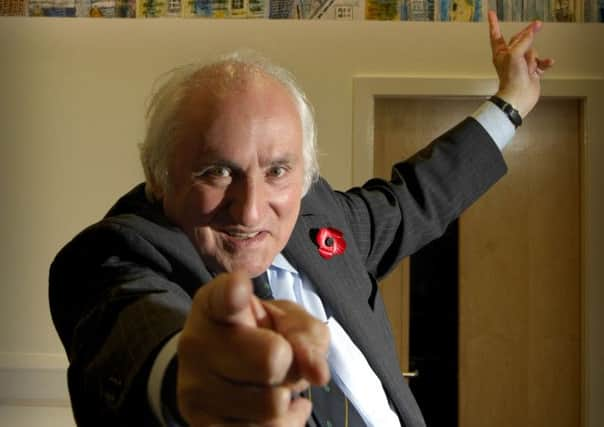Richard Demarco ‘keeps out’ of independence debate


Arts impresario Richard Demarco, who has attended every Edinburgh Festival since its inception in 1947 and brought artists from all over Europe to the city since the 1960s, has vowed to remain “apolitical” in the run-up to the vote.
Violinist Nicola Benedetti, comedian Billy Connolly, singer-songwriter Annie Lennox, actor James McAvoy, cyclist Chris Hoy and tennis ace Andy Murray are among those who have already vowed to remain neutral over Scotland’s future.
Advertisement
Hide AdAdvertisement
Hide AdDemarco, 83, who received a major civic honour from his home city in Edinburgh last week, told The Scotsman that he has long felt art and politics do not sit comfortably together.
The co-founder of the Traverse Theatre, who was named European Citizen of the Year last summer after more than half a century working with artists, said had decided to “keep out” of the independence debate because of the “family of thousands of artists of various political persuasions” he works with.
Born in Edinburgh in 1930, Demarco has long been seen as one of the most influential cultural figures in Scotland, having been the long-time curator of visual art at the Edinburgh International Festival and the collector of a huge archive which the Scottish Government is trying to find a permanent home for.
Speaking to The Scotsman ahead of a major lecture in Edinburgh last night, Demarco said he had always considered himself as a European rather than a Scot. But he also said there was “no question” Scotland had a distinct culture from England.
Demarco said: “I am completely apolitical. I cannot be seen to be taking sides. I don’t represent one particular political viewpoint.
“I have to keep out of the debate because I represent a family of many thousands of artists of every shade of political opinion.
“I’ve never once made the mistake of supporting an artist because of his or her political stance. The language of art is not the language of politics. The language of art binds people together - it doesn’t separate them. It is all-embracing. It takes into account everyone’s point of view. Robert Burns is the perfect example of an artist who cannot be nailed down.”
Demarco, who is famed for bringing avant-garde art from around Europe to Edinburgh as far back as the 1960s, was awarded the CBE in the Queen’s New Year Honours List in 1997 and was honoured with a major retrospective at the Royal Scottish Academy in 2010 to coincide with his 80th birthday. He is believed to have the biggest archive relating to the Edinburgh Festival.
Advertisement
Hide AdAdvertisement
Hide AdScottish culture secretary Fiona Hyslop, who is spearheading efforts to find a permanent home for this collection, last month described it as having the potential to be a “valuable public and academic resource, rooted in Scotland, deeply connected to the rest of the UK, Europe and beyond.”
Demarco said: “There’s absolutely no doubt in my mind that the culture of Scotland is a unique contribution to European culture. It is easily recognised as different from English, Welsh and Irish culture and it’s been a fantastically important contribution.
“I don’t think enough attention has been paid to the particular nuances and quality of Scotland’s contribution to world culture.”
He added: “I got the (European Citizen of the Year) award for my work to bind together the nations of the European Union through the arts and because I crossed the Iron Curtain around 50 times when Europe was severely damaged and was in two parts.
“My blood is Italian but I have a touch of Irish from my mother’s family. My instinct, from the moment I was born in Edinburgh, into an Italian Roman Catholic ghetto as the son of immigrants was to be grateful to be living my life in Europe. I think I am the very personification of a European.
“I do as much as I can, through the arts and working with my fellow Europeans, to celebrate the hopes and aspirations of people who believe we can live in a civilised manner without war. At least three quarters of my life have been during periods of conflict.”